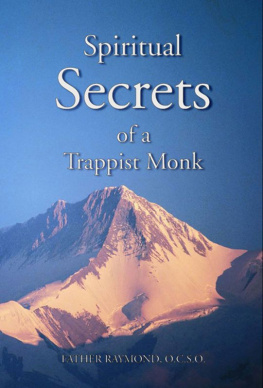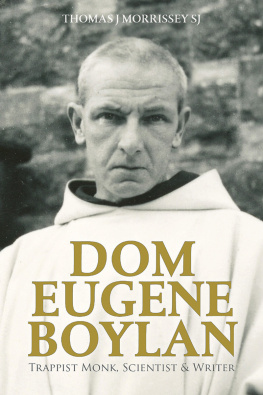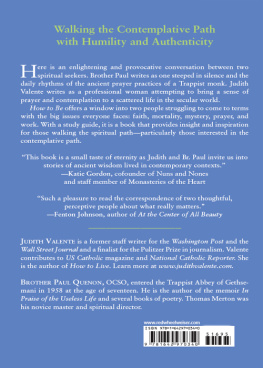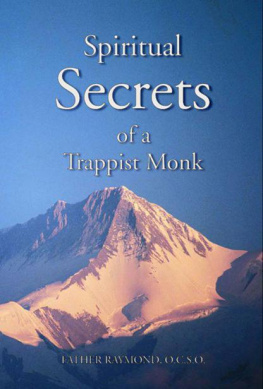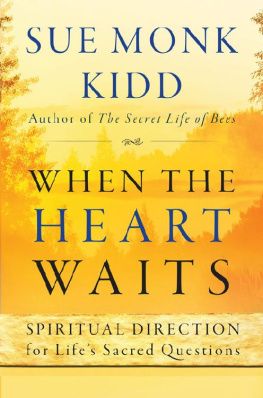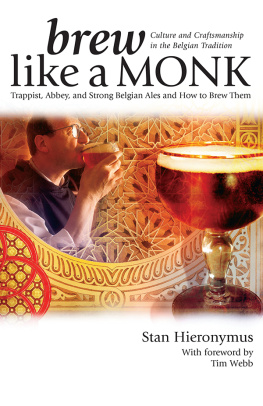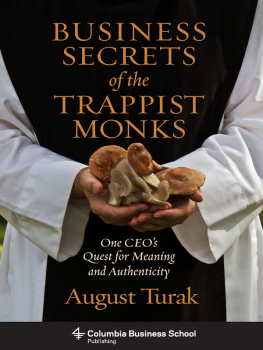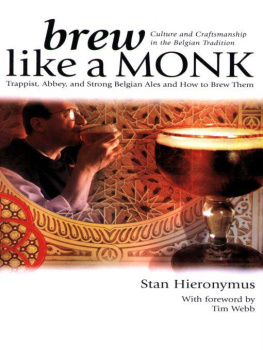

Spiritual Secrets of
a Trappist Monk

Spiritual Secrets of a Trappist Monk: The Secret of Who You Are and What God Calls You to Be was originally published in 1957 by the Bruce Publishing Company, Milwaukee, Wisconsin, under the title You. This 2000 edition by Sophia Institute Press contains editorial revisions to the original text.
Copyright 2000 Sophia Institute Press
All rights reserved
Printed in the United States of America
Jacket design by Lorraine Bilodeau
Jacket photo 2000 David Sutherland / Stone
No part of this book may be reproduced, stored in a retrieval system, or transmitted in any form, or by any means, electronic, mechanical, photocopying, or otherwise, without the prior written permission of the publisher, except by a reviewer, who may quote brief passages in a review.
Sophia Institute Press
Box 5284, Manchester, NH 03108
1-800-888-9344
www.sophiainstitute.com
Nihil obstat: Fr. M. Gabriel OConnell, O.C.S.O., Censor
Fr. M. Thomas Aquinas Porter, O.C.S.O., Censor
Imprimi potest: Fr. M. Gabriel Sortais, O.C.S.O., Abbas Generalis
Nihil obstat: Rev. John A. Schulien, S.T.D., Censor Librorum
Imprimatur: Albert G. Meyer, D.D. Archbishop of Milwaukee
October 8, 1957
Library of Congress Cataloging-in-Publication Data
M. Raymond, Father, O.C.S.O., 1903-
Spiritual secrets of a Trappist monk : the truth of who you are and what God calls you to be / Father M. Raymond.
p. cm.
Rev. ed. of: You. 1957.
Includes bibliographical references.
ISBN 1-928832-07-5 (pbk. : alk. paper)
1. Man (Theology) 2. Catholic Church Doctrines. I. M. Raymond, Father, O.C.S.O., 1903 You. II. Title.
BT701.2.M2 2000
233 dc21 | 00-034448 |
To the honor of
Mary Immaculate,
Mother of Christ and of all His members,
and to the memory of
Michael Joseph Henry, M.D.,
stalwart member of Christs Mystical Body
and sterling friend
Know thyself!
is a precept that
binds the whole world.
Every man, whether Christian or
non-Christian, should know himself.
He can and ought to know himself free and that is his greatness, to be free and to know that he is so but he ought also to understand that he is himself the author neither of his being nor of his liberty, nor of his knowledge of the one or the other. And thence arises for every man equally the strict obligation to love God with his whole soul and his whole heart, and above all things, whether he be Christian or not.
We have no need to know Christ to recognize this duty;
we have only to know ourselves.
Etienne Gilson
The Mystical Theology of St. Bernard

Contents

Spiritual Secrets of
a Trappist Monk
Publishers Note
Father M. Raymond, the author of Spiritual Secrets of a Trappist Monk , is a soul aflame with love for God. This love often impels him to verbal heights that, to some, may seem to border on the unacceptable, e.g., his statements in these pages about the divinity and priesthood of every individual. He was, however, a loyal son of the Catholic Church; he wanted all who encounter these pages to understand his words in full accord with the mind of the Church.
Accordingly, please read these chapters completely and carefully before forming any judgments about what Father Raymond is saying. In all cases, as you will see, he explains his verbal enthusiasms according to the teaching of the Churchs Magisterium.
Editors Note
Except where otherwise noted, the biblical quotations in the following pages are based on the Kleist-Lilly translation of the New Testament and the Knox translation of the Old Testament. Where applicable, quotations have been cross-referenced with the differing names and enumeration in the Revised Standard Version, using the following symbol:
(RSV=).

Do something that brings comfort, convenience, or practical usefulness to your fellowmen, and, according to Antoine de Saint-Exupry, in The Wisdom of the Sands, you have done nothing. But raise them a pedestal, build them a stairway, make them a ship that will bring them to God, and you have produced.
This book is made to be a high pedestal, a steep stairway, a ship strong enough to plow lifes roughest, deepest seas and never founder; and the pedestal, the stairway, and the ship are yours, for this book has been written exclusively for, and entirely about, you.
But, who are you?
That question sounds simple. But be not deceived by its sound. It is one of the most penetrating questions you will ever face, one of the most difficult you will ever attempt to answer. For it probes more than your mind and your memory. It searches as God is said to search the deepest secret of your being. And that is one secret too often kept, even from yourself.
Arthur Schopenhauer, who tried to teach philosophy at the University of Berlin in the middle of the nineteenth century, was one day walking down the street buried in thought. In his abstraction, he accidentally bumped into a pedestrian. Irritated by the jolt, and by the seeming indifference of the philosopher, the pedestrian angrily demanded, Who are you, anyhow? Schopenhauer, still deep in his meditation, replied, Who am I? How I wish I knew!
That answer gives insight into the root cause of many of Schopenhauers dark and dismal philosophical aberrations. It is an admission of ignorance that accounts, in no slight degree, for Schopenhauers whole system of pessimism. For any mans answer to the question Who are you? lays bare the very essence of his philosophy of life.
Nothing more personal could ever be asked, nor anything more important. Yet, few indeed are they who have a ready reply to the question, and fewer still are they who grasp its transcendent import. Many people today have wide and, occasionally, deep knowledge of countless things outside themselves; but pitiful, and even frightening, is the knowledge they have of themselves.
Recently several hundred average Americans were stopped on the street, visited in their homes, confronted in their offices or other places of employment, and asked to help out in a survey that was being conducted by some university psychologists. These people were handed a plain sheet of paper, then told that they would be rendering a real service if they would write on that paper three replies to a very simple question. It was: Who are you?
Most people gasped. Some started stuttering. Not a few exclaimed, Who am I? Why, this is the queerest question I ever heard! Undoubtedly, it was for hundreds. But from the replies submitted, it was evident to the psychologists in the University of California at Los Angeles that at last, after months of seeking, they had found what they desired: the single question which, in the shortest space of time, will reveal most about the individual interrogated. Who am I? wrote one man. Why, I dont know. I see myself a little inferior to others. I guess I am something put on this earth to make it a better place for those who come after me. That man was a builder. One wonders how much building of his own life, of his own character, he had done.
Next page
